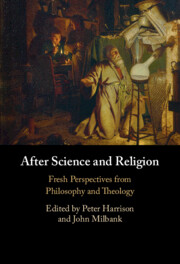Book contents
- After Science and Religion
- Reviews
- After Science and Religion
- Copyright page
- Contents
- Contributors
- Acknowledgements
- Introduction
- Part I Modern Historians on ‘Science’ and ‘Religion’
- Part II Beyond ‘Science and Religion’
- Chapter 3 Science and Theology
- Chapter 4 Religion, Science and Magic
- Chapter 5 Science, Beauty and the Creative Word
- Chapter 6 Questioning the Science and Religion Question
- Chapter 7 Truth, Science and Re-enchantment
- Chapter 8 Understanding Our Knowing
- Part III Philosophical Problems with ‘Science’ and ‘Religion’
- Part IV Before Science and Religion
- References
- Index
Chapter 4 - Religion, Science and Magic
Rewriting the Agenda
from Part II - Beyond ‘Science and Religion’
Published online by Cambridge University Press: 05 May 2022
- After Science and Religion
- Reviews
- After Science and Religion
- Copyright page
- Contents
- Contributors
- Acknowledgements
- Introduction
- Part I Modern Historians on ‘Science’ and ‘Religion’
- Part II Beyond ‘Science and Religion’
- Chapter 3 Science and Theology
- Chapter 4 Religion, Science and Magic
- Chapter 5 Science, Beauty and the Creative Word
- Chapter 6 Questioning the Science and Religion Question
- Chapter 7 Truth, Science and Re-enchantment
- Chapter 8 Understanding Our Knowing
- Part III Philosophical Problems with ‘Science’ and ‘Religion’
- Part IV Before Science and Religion
- References
- Index
Summary
Inherited discussions of ‘science and religion’ too much assume an interaction between two historically constant phenomena in terms of stories of ‘progress’ and ‘conflict’. Instead, it is better to recognise long-term and varying modes of tension between three different approaches to nature, pivoted about attitudes to ‘enchantment’ and to transcendence versus immanence. Within such a perspective, it appears that the dominant model of science as ‘disenchanted transcendence’ is a Newtonian one that historically quickly proved inadequate. Alternative and earlier traditions of ‘natural magic’ later returned under new guises and are closer to the essence of the ‘ergetic’ or experimental attitude that lies at the real core of ‘science’. The Newtonian model also implausibly suppressed the realities of motion, time, change, substantial form and secondary qualities. But contemporary physics points towards their restoration and to nature as a vital habit and form-shaping process, as well as to the ‘magical’ character of powers and causes. Magic, rightly understood, is a necessary mediator between religion as theory and science as practice and is a crucial aspect of an ergetic understanding of ‘enchanted transcendence’ which is the most promising perspective for today.
- Type
- Chapter
- Information
- After Science and ReligionFresh Perspectives from Philosophy and Theology, pp. 75 - 143Publisher: Cambridge University PressPrint publication year: 2022
- 3
- Cited by



